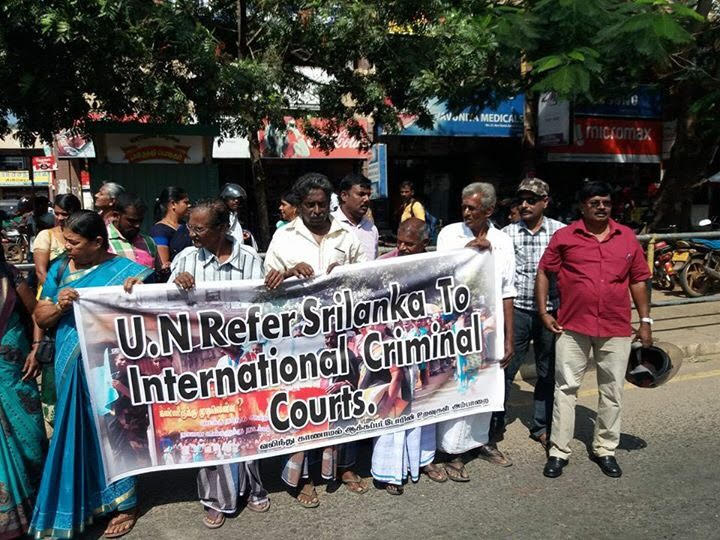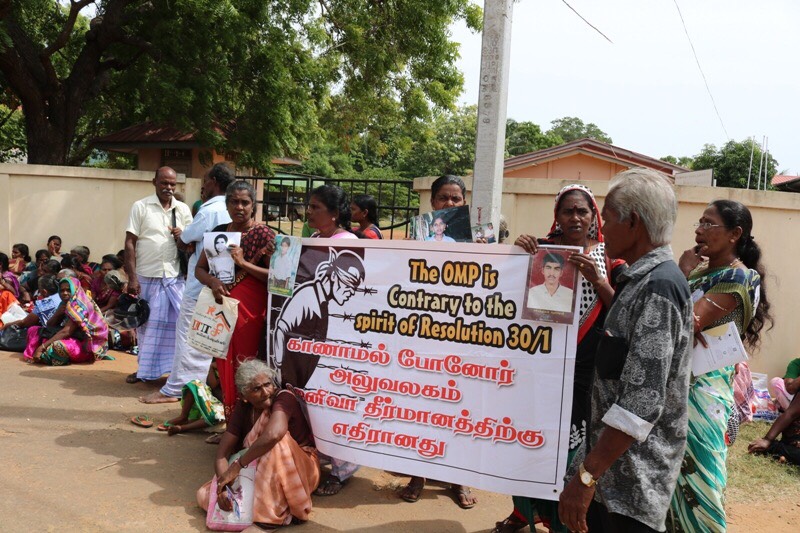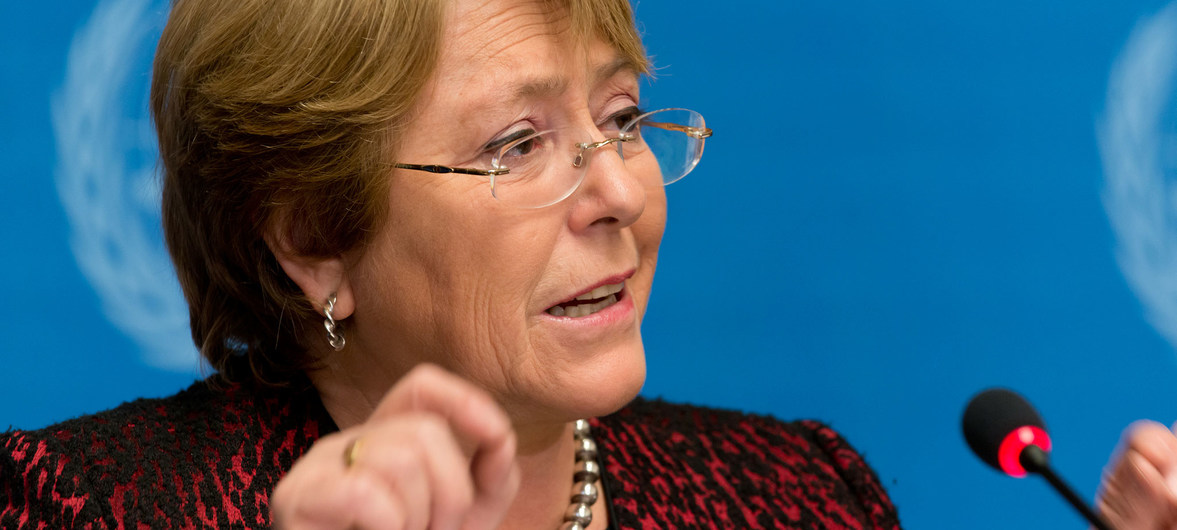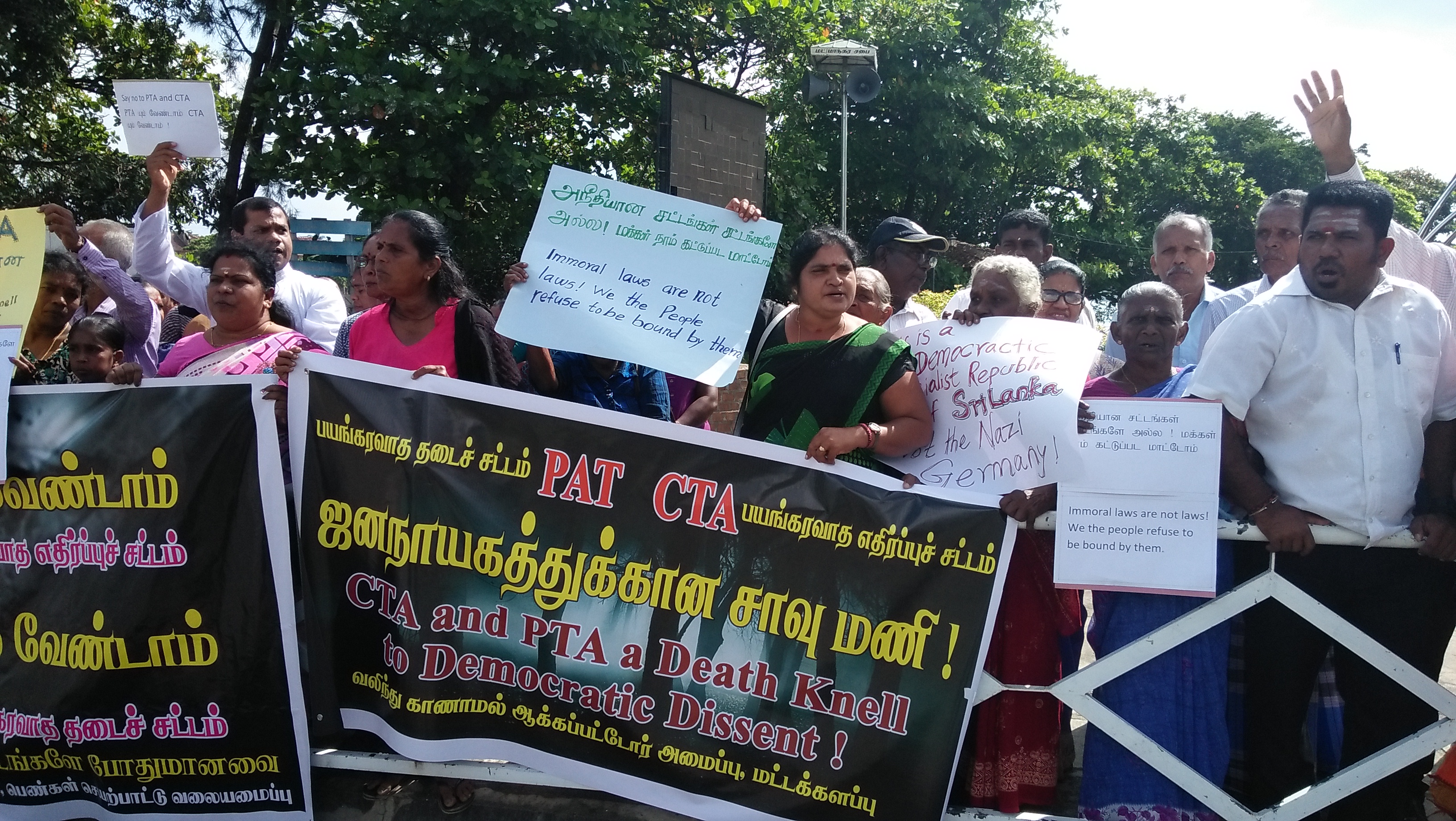'Virtually no progress' in Sri Lanka on war crimes investigations says UN human rights chief's office

09 March 2019
Lanka has made "virtually no progress" on the investigation of war crimes, the Office of the United Nations High Commissioner for Human Rights, Michelle Bachelet, said in its report on Sri Lanka's efforts towards implementing resolution 30/1, which called for accountability and transitional justice through a hybrid mechanism.
The report also raised concerns over the on-going reports of abduction, torture and sexual violence, institutional failures within the criminal justice system, ongoing harassment of human rights defenders since 2015 and the military’s continued occupation of civilian land.
Read the full report here.
Criminal justice

Highlighting the failure of Sri Lanka to investigate war crimes and the growing calls by Tamil families and civil society groups across the North-East for Sri Lanka to be referred to the International Criminal Court, the report said:
"The High Commissioner stresses that the risk of new violations increases when impunity for serious crimes continues unchecked. To date, Sri Lanka has failed to seize the opportunity provided by the Human Rights Council to establish a trustworthy domestic mechanism to address impunity or to show, by consistent progress in emblematic cases, that such a mechanism is not necessary.Some segments of civil society have continued to call for international investigations and for the Security Council to refer the situation in Sri Lanka to the International Criminal Court for international prosecutions and adjudication of those most responsible for these crimes."
The OHCHR reported a seeming inability or unwillingness to hold perpetrators of human rights violation to account, stating that instead what is seen is “lengthy delays in investigations and in judicial processes in general” as well as “a bail system that is applied inconsistently and in a discriminatory way”. The few marks of progression are the result of “persistence and commitment of individual investigators despite political interference, patronage networks and a generally dysfunctional criminal justice system”, the OHCHR noted.
Highlighting the Sri Lankan government's assertion that independent foreign judges are not needed, the report details an abundance of “evidence that the ordinary criminal justice system is unable to deal with the nature of allegations and the complexity of crimes”.
The lack of political will to implement reform is further emphasised by the fact that both the President and Prime Minister have rejected the need for foreign assistance in reforming their institutions, the reported noted.
"The Government has not announced any plan to create a special judicial mechanism, despite the commitment it implicitly undertook when it co-sponsored Human Rights Council resolution 30/1 and the recommendations contained therein. It has indeed denied the need for such a mechanism, particularly with respect to the involvement of foreign judges, despite abundant evidence that the ordinary criminal justice system is unable to deal with the nature of allegations and the complexity of crimes. Both the President and the Prime Minister have made statements denying the need of foreign assistance in this matter.In 2015, the High Commissioner stated that, for accountability to be achieved in Sri Lanka, more than a domestic mechanism would be required (A/HRC/30/61, para. 88). The lack of substantial progress in establishing criminal accountability for serious crimes in the past three years underscores the relevance of that assessment.Moreover, claims that a domestic specialized process could suffice have not been accompanied by any serious attempt to establish one. No effort has been made to build the capacity required to conduct investigations, including forensic ones, or prosecutorial strategies, despite the repeated recommendations of the Special Rapporteur on truth, justice, reparations and guarantees of non-recurrence.The gravity of the cases that a specialized accountability mechanism must address cannot be underestimated. On that point, the High Commissioner reiterates the principal findings of the investigation conducted by OHCHR in 2015, which demonstrated that there were reasonable grounds to believe that gross violations of international human rights law, serious violations of international humanitarian law and international crimes had been committed by all parties during the period under review; and that indeed, if established before a court of law, many of the allegations may, depending on the circumstances, amount to war crimes if a nexus were to be established with the armed conflict and/or crimes against humanity if committed as part of a widespread or systematic attack against a civilian population (A/HRC/30/61, para. 24).Since 2015, virtually no progress has been made in investigating or prosecuting domestically the large number of allegations of war crimes or crimes against humanity collected by OHCHR in its investigation, and particularly those relating to military operations at the end of the war."
Intimidation and sexual violence
File photograph
Expressing concern over the ongoing harassment and surveillance of human rights defenders and victims of human rights violation, the report detailed at least two incidents in 2018 where human rights defenders were assaulted by “unidentified aggressors, presumably in connection to their advocacy on cases of disappearance”.
"Some serious concerns nonetheless persist. Reports of harassment or surveillance of human rights defenders and of victims of human rights violations have continued. In 2018, at least two incidents were reported involving the assault of human rights defenders by unidentified aggressors, presumably in connection to their advocacy on cases of disappearance. Other human rights defenders have reported being questioned by the authorities after having travelled to Geneva to attend sessions of the Human Rights Council.One Sri Lankan United Nations staff member was visited by armed men who questioned him about his activities in support of visits by diplomats and United Nations officials, including the United Nations High Commissioner for Human Rights in 2013. Such cases suggest that informal and often extralegal intelligence gathering activities have not ceased, despite the recommendations made thereon. The surveillance or intimidation of victims and activists is incompatible with the reconciliation agenda, and perpetuates a mistrust in State institutions that could undermine the effectiveness of transitional justice mechanisms. If such acts do not represent government policy, as the High Commissioner was repeatedly assured, the Government must denounce them publicly and ban them, and take disciplinary, and when relevant, judicial action against the officers concerned."
The report detailed the ongoing cases of abduction and torture by Sri Lankan security forces which allegedly took place between 2016 and 2018, pointing out that contrary to government assurances there were no investigations currently being undertaken.
"OHCHR has continued to receive credible information about cases of abduction, unlawful detention, torture and sexual violence by Sri Lanka security forces, which allegedly took place in 2016 to 2018. A preliminary assessment of the information received indicates that there are reasonable grounds to believe that accounts of unlawful abductions and detention and of torture, including incidents of sexual violence against men and women, are credible, and that such practices might be continuing in northern Sri Lanka. Such allegations should be the subject of prompt, effective, transparent, independent and impartial investigations. In the past, the Government has condemned any act of torture, and indicated that any allegation of torture would be properly investigated and prosecuted. OHCHR is not aware of any investigations undertaken to date into the above-mentioned allegations."
Prevention Against Terrorism Act (PTA)
The report also highlighted the government’s failure to fully repeal the draconian PTA which it had committed to review and repeal in 2015. Draft legislation has been considered for the Counter-Terrorism Act (CTA) but as the report notes there are “serious shortcomings”. Despite this, the Cabinet had approved the bill in April 2017 where it was later withdrawn for revision. A later version with improvements was presented to parliament on 9th October 2018.
The PTA remains a cause for concern within the Tamil community who have been subject to arbitrary detention under this legislation. Research gathered by the report maintains that “at 25 January 2019, 58 individuals detained under the Act were facing trial and three suspects were awaiting indictment”.
"A key commitment of the Government in 2015 was to review and repeal the Prevention of Terrorism Act. Draft legislation in the form of a counter-terrorism law, with serious shortcomings, was approved by the Cabinet on 25 April 2017 and later withdrawn for revisions. An improved revised version was presented to the parliament on 9 October 2018. In a determination issued in November 2018 on the constitutionality of the revised bill, the Supreme Court ruled that the death penalty had to be included as punishment to prevent inconsistencies with the Penal Code. It also found that a reference in the bill relating to its compliance with the law, including international human rights instruments to which Sri Lanka is a party, was incompatible with the Constitution, which does not regard “international instruments” as law. The relevant oversight committee of the parliament will be required to take up the amendments proposed by the Supreme Court; meanwhile, there are concerns that other new amendments, reportedly suggested in Cabinet for incorporation at the parliamentary committee stage, might further weaken the bill’s compliance with international best practices.The High Commissioner is concerned that, despite its lengthy preparation and the consultation of expert advice, the final bill might not comply fully with international human rights norms and standards. Even in its present form, the bill contains problematic features, such as an overly broad definition of terrorism."
Land grabs
With respects to the military’s occupation of land the Commissioner applauds the efforts made by the government and President Sirisena suggestion that “all civilian land in the North and the East would be released by the end of 2018”. The commissioner, however, also notes that often the land returned had only been partial or incomplete with “access to dwellings but not to livelihood resources” or vice versa. Public services such as schools are also unavailable and there have a number of reports of “property being destroyed shortly before it was returned”.
Tamil communities allege that this projects such as those on irrigation, forestry and archaeological are attempts to colonise the land and perpetuate military control over economic activity.
"While the High Commissioner acknowledges the significant amount of land returned to date, she still has concerns about the process; for example, some restitutions have been only partial or incomplete, allowing for access to dwellings but not to livelihood resources (such as agricultural land or fishing resources) or vice versa. On other occasions, public services, such as schools, remain unavailable. There have also been cases of property being destroyed shortly before it was to be returned. Furthermore, communities have complained about new land grabs and other contentious land issues, such as alleged “colonization” through the establishment of irrigation, forestry and archaeological projects, and of continued military involvement in economic activities. Such situations prevent the resumption of livelihoods, unlike what was encouraged by the Human Rights Council in its resolution 30/1."While the High Commissioner acknowledges the significant amount of land returned to date, she still has concerns about the process; for example, some restitutions have been only partial or incomplete, allowing for access to dwellings but not to livelihood resources (such as agricultural land or fishing resources) or vice versa. On other occasions, public services, such as schools, remain unavailable. There have also been cases of property being destroyed shortly before it was to be returned. Furthermore, communities have complained about new land grabs and other contentious land issues, such as alleged “colonization” through the establishment of irrigation, forestry and archaeological projects, and of continued military involvement in economic activities. Such situations prevent the resumption of livelihoods, unlike what was encouraged by the Human Rights Council in its resolution 30/1.The military should only retain land when strictly necessary for security purposes, with proper compensation paid to those dispossessed. As recommended by the High Commissioner in previous reports, independent mechanisms should determine such matters. Moreover, the emotionally and politically charged issue of land, with regard to both individual ownership and communities’ sense of belonging to a given area, should be addressed in a sensitive manner, not least because it is considered by many stakeholders one of the root causes of conflict. Any State-promoted settlement of people or land acquisition on cultural, archaeological, development or environmental grounds should be carefully considered, given the adverse impact on reconciliation. Decision-making with regard to relocation and resettlement should be made through transparent processes and following meaningful consultation with the people and the communities affected."
The Office of Missing Persons

Welcoming the establishment of the Office of Missing Persons (OMP), the OHCHR raised concerns over its approach and lack of results.
The Sri Lankan government has provided short-term relief for families of victims and placed this as a priority but, as the report states, there is a “lack of a comprehensive strategy and of outreach on the process to address the past”. The inability to provide tangible results and extensions of deadlines has diminished victims' faith in the office. This is most evident with the recent protests in Mannar.
The report maintains that OMP “must find a balance between the need to establish itself as a lasting institution with solid foundations and the expectation of immediate results, which would give victims the incentive to cooperate with the body”. This requires both short-term and long-term priorities.
Part of this process, the UN Commissioner maintains, is reconciling with and being accountable for past atrocities. The Commissioner notes that a mass grave with more than 300 skeletons was recovered in Mannar on 29th May 2018, this was the second mass grave with the first discovered in 2014. The remnants of these bodies need to examined and identified to provide closure for the victims. The report notes that “other mass graves might be expected to be found in the future” and that systematic access to the graves by the Office is essential.
Recommendations
Recommendations to Sri Lanka
Highlighting the failure of adequate progress on war crimes investigations, the OHCHR stated:
"With regard to legislation and justice, the High Commissioner recommends that the Government:(a) Accede to the additional protocols to the Geneva Conventions and to the Rome Statute of the International Criminal Court;(b) Enact legislation to criminalize war crimes, crimes against humanity, genocide and enforced disappearances without statutes of limitation, and enact internationally recognized modes of criminal liability, in particular with regard to command or superior responsibility;(c) Adopt legislation establishing a hybrid court to investigate allegations of violations and abuses of international human rights law and violations of international humanitarian law"
Pointing to the reports of ongoing torture and sexual violence, the OHCHR urged Sri Lanka to send a statement be sent to branches of the security force maintaining the country's opposition to such violations and hold perpetrators accountable. It called for a vetting process which would remove from office and prevent from serving in UN peacekeeping operations, those military personnel involved in human rights violations. These reforms must be supplemented with institutional reform of the security sector “to strengthen accountability and civilian oversight”.
The OHRHC said it was necessary for the government to order an end to “all forms of surveillance and harassment of and reprisals against human rights defenders, social actors, and victims of human rights violations”. The demand to end the arbitrary detention of civilians was further addressed by the report’s call to replace the PTA with “legislation that adheres to the best international practices”.
With respects to the military’s seizure of land the report called for the establishment of an independent mechanism “to determine specific cases in which land must be allocated for military use owing to security reasons and identify appropriate compensation or substitution for landowners or occupants.
It urged the government to ensure the Office of Missing Persons and the Office for Reparations was properly funded and supported, encouraging it to develop “a national reparations policy that takes into account the specific needs of women and children and psychosocial support for victims”.
Recommendations to UN and Member States
The OHCHR urged UN member states are advised to "investigate and prosecute, wherever possible, in particular in accordance with universal jurisdiction principles, those allegedly responsible for such violations as torture, enforced disappearance, war crimes or crimes against humanity; and explore other options to advance accountability in the absence of credible domestic processes” and continue to.aid Sri Lanka in this process and to encourage the Human Rights Council to continue its engagement and monitoring of the country.
It recommended the UN continues to provide technical and financial support to Sri Lanka to aid effort transitional justice, “provided that they meet international standards”, as well as advising a strict vetting process for Sri Lankan military and police personnel under consideration for peacekeeping operations, military exchanges and training programmes.
The High Commissioner recommends that Member States:(a) Urge the Human Rights Council to continue its close engagement with the Government of Sri Lanka and to monitor developments in the country;(b) Investigate and prosecute, wherever possible, in particular in accordance with universal jurisdiction principles, those allegedly responsible for such violations as torture, enforced disappearance, war crimes or crimes against humanity; and explore other options to advance accountability in the absence of credible domestic processes.(c) Continue to accompany the people of Sri Lanka in their efforts to address past human rights violations by supporting the establishment of adequate systems of accountability, justice and reconciliation.
Read the full report here.


